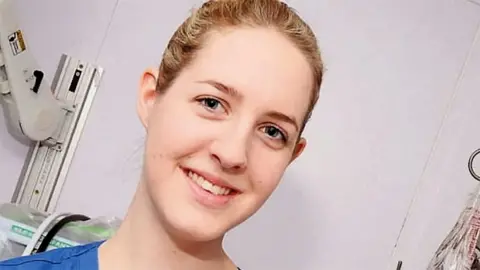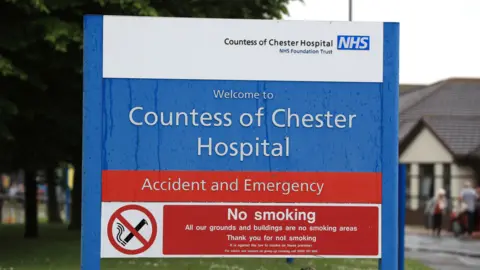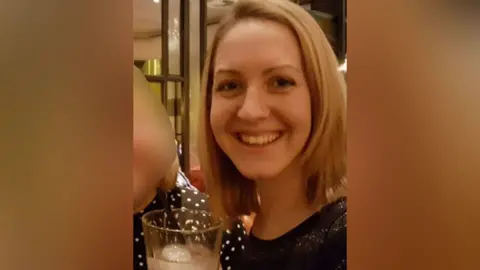Lucy Letby: Baby making progress before collapse, trial hears
 SWNS
SWNSA baby girl who was allegedly attacked by nurse Lucy Letby was making "steady and encouraging progress" before she collapsed, a court has heard.
Ms Letby is accused of attempting to kill the girl, known as Child J, at the Countess of Chester Hospital in 2015.
Manchester Crown Court heard how medical tests carried out shortly after her collapse found "nothing to explain why she had deteriorated".
Ms Letby, 33, originally of Hereford, denies all of the charges against her.
Child J, who cannot be named for legal reasons, was born at 32 weeks plus two days gestation at the Countess of Chester Hospital in October 2015.
The court heard Child J had a condition called necrotising enterocolitis, where a portion of the bowel becomes inflamed, as well as a perforated bowel.
She was transferred to Alder Hey Children's Hospital in Liverpool for surgery.
Child J needed two stomas, where part of the bowel is left outside the body to allow it to rest after surgery.
The baby girl returned to the Countess of Chester Hospital on 10 November 2015 with her condition described as stable, the court heard.
Dr John Gibbs, a consultant paediatrician, said Child J had been making "steady, acceptable and encouraging progress".
He added that within two-and-a-half weeks, Child J had moved on to bottle feeds and was "fine" and without any respiratory complications.
 PA Media
PA Media"It was a challenge managing Child J's stomas because we rarely had babies with a stoma needing recycling feeds [at the Countess of Chester Hospital]," he said.
He added this was discussed with the neonatal team at Alder Hey Children's Hospital, who dealt with stomas "fairly frequently", and they "were satisfied with her progress".
But in the early hours of 27 November 2015, Child J suffered seizures and four desaturations with her heart rate also dropping on the third and fourth occasion, the court heard.
"Both occurring together is of more concern than one occurring by itself," Dr Gibbs told the court.
Dr Stephen Brearey, who reviewed medical tests carried out that day, said "nothing explained" why the infant had collapsed.
"She [Child J] normalised very quickly over the course of the day and all the investigations we had undertaken couldn't identify why she had the desaturations or explain why she had a seizure.
"I do know hypoxia causes seizures so that would be possibly the most likely cause.
"There remains the question why was [Child J] hypoxic when two or three weeks beforehand she had been breathing normally in air and there was no suggestion of infection.
"In fact, we stopped antibiotics 36 hours after starting them because there was no evidence of infection in the blood tests and she remained well for weeks afterwards."

He reviewed further tests two days later on 29 November 2015 where he described her as in a "good condition".
"I didn't have any concerns at that stage," he said.
"Looking back on it now we didn't have an explanation for the events on 27 November.
"Sometimes these can show themselves later down the line."
But he added "there was nothing of anything of concern at that time" following investigations undertaken by the hospital and discussions with Alder Hey Children's Hospital.
Earlier, nurse Mary Griffith - who worked more than 40 years at the Chester hospital before retiring in 2016 - agreed with Ben Myers KC, defending, that Ms Letby was "knowledgeable", "caring" and "thorough" in her job.
She also agreed there seemed to a "very high admission rate" to the neonatal unit around 2015-2016.
Child J was discharged home in January 2016 and was described as progressing "very well" at her final outpatient clinic more than a year later.
Manchester Crown Court previously heard the baby's collapse was consistent with some form of obstruction of the airways, such as smothering.
Ms Letby denies murdering seven babies and attempting to murder 10 others.
The trial continues.

Why not follow BBC North West on Facebook, Twitter and Instagram? You can also send story ideas to [email protected]
